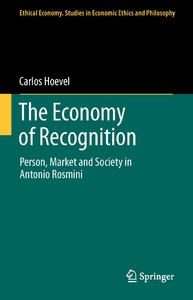Por favor, use este identificador para citar o enlazar este ítem:
https://repositorio.uca.edu.ar/handle/123456789/19335| Título: | The economy of recognition: person, market and society in Antonio Rosmini | Autor: | Hoevel, Carlos | Palabras clave: | PENSAMIENTO ECONOMICO; PENSAMIENTO FILOSOFICO; UTILITARISMO; PERSONALISMO; Rosmini, Antonio, 1797-1855 | Fecha de publicación: | 2013 | Editorial: | Springer | Resumen: | This book intends to introduce an alternative to the Hegelian foundation of a recognition paradigm in economics based on the viewpoint of the Italian philosopher Antonio Rosmini (1797–1855). Ignored by many in the world of philosophy even in our days, Rosmini was a thinker contemporary with Hegel who formulated a philosophical system as important and deep as the latter’s. Like Hegel, Rosmini builds a general interpretation of modernity and particularly of economics upon an idea of a recognition that seeks to do away with the idea of a modern individualist subject. Rosmini argues that human action is not restricted to the individual’s self-referential framework and to self-preservation natural needs; on the contrary, it involves a wider spiritual dynamics by which the individual self somehow “goes out of himself,” meets the others and, only then, he is able to rediscover himself. Just like Hegel, Rosmini believes that the properly human dimension can be attained through a progressive recognition process which makes people realize that life is not just about following passively the course of their natural and individual impulses and needs, but it is necessary to “spiritualize” and “universalize” them so as to integrate them into a more comprehensive dimension. However, Rosmini departs from Hegel, or at least from his traditional interpretation, when Hegel understands recognition in terms of the disposal of the empirical individuality in favor of a supraindividual “we” (Objective and Absolute Spirit). On the contrary, Rosmini affirms that even though the dynamics of recognition limits our own individuality, it does not imply its denial. As we shall see in the conclusion, just like the eminent economic philosophers of all times – Smith, Hegel, Marx, Croce or Bulgakov – Rosmini has tried to elevate economic science to a wider sphere that, at the same time, could embrace and surpass its traditional form.While to some authors that wider sphere should be reached through the State, society or the market, Rosmini believes that what economics and the economy need is to acknowledge the human person, the key concept of his audacious attempt to give modernity a new and wider horizon of meaning. | URI: | https://repositorio.uca.edu.ar/handle/123456789/19335 | ISBN: | 978-94-007-6058-5 | Derechos: | Atribución-NoComercial-CompartirIgual 4.0 Internacional |
| Aparece en las colecciones: | Libros/partes de libro |
Ficheros en este ítem:
| Fichero | Descripción | Tamaño | Formato | Login |
|---|---|---|---|---|
| economy-recognition-person.pdf | 1,78 MB | Adobe PDF | SOLICITAR ACCESO | |
| economy-recognition-person.jpg | 103,59 kB | JPEG |  Visualizar/Abrir |
Este ítem está sujeto a una Licencia Creative Commons

